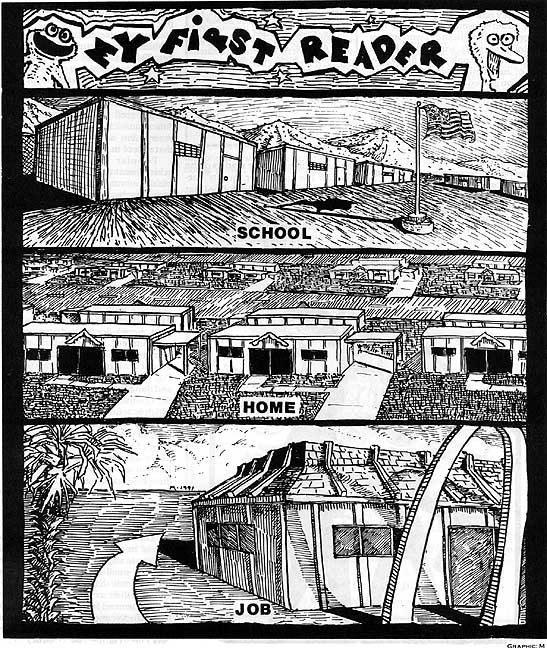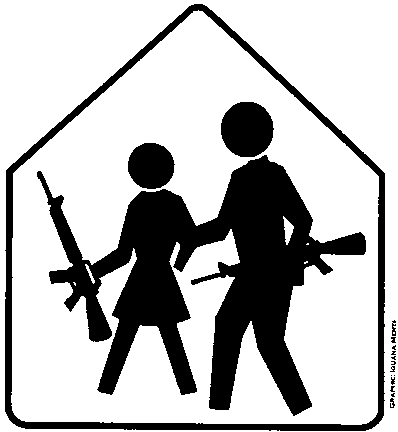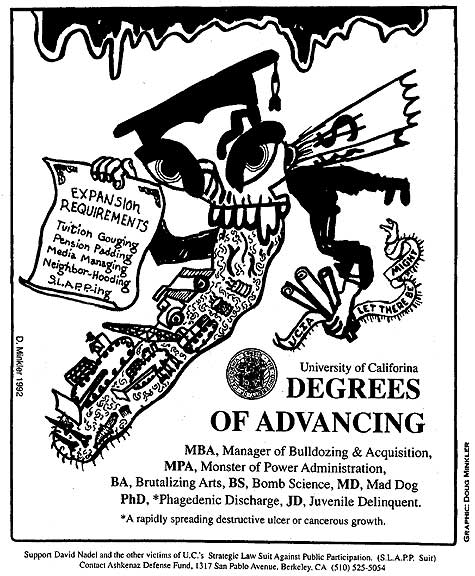| Every
young person is required by law to suffer the best hours of the day trapped
in an ugly, overcrowded room, facing front and listening to a frustrated
civil servant. The teacher probably knows that school is a waste of time
but needs the paycheck and can't find work elsewhere. He or she answers
to the principal who is subordinate to the superintendent who in turn is
subordinate to the District. The alleged beneficiary of this process, the
student, is at the bottom of a long chain of command, relegated within a
hierarchy of classes and grades and tracks within grades. The student learns
that he or she is an isolated object in an undifferentiated mass whose own
intellectual, social, or sensual interests are irrelevant and disruptive.
Schools indoctrinate that life is by necessity routine,
impersonal and boring; that one's best interest is to shut up and conform;
that spontaneity, creativity and free thought are to be regarded with
suspicion and hostility. Gutlessness and apathy are rewarded while independent
initiative is deterred by fear of failure and the prospect of punishment.

Schools emphasize students' relationships with adult authorities
while devaluing peer relationships. However, the crowding and rigid scheduling
allow for little personal contact between students and teachers. Social
contact between adults and children outside of the family is rare and
suffused with sexual anxiety. A student gets individual attention only
through being disobedient; by the time the school shrink or guidance counselor
meets with the student, he or she's been written off as incorrigible.
Even when the classroom isn't overcrowded, individual engagement
with the lessons is undermined by the machine‑like structure of
the learning process. Lessons are largely handed down by an invisible
bureaucracy. Instruction is programmed to shape acceptable responses according
to a predetermined goal — passing tests. The academic material itself
is a kind of trivia with planned obsolescence, to be consumed and thrown
away after its function is served.
Schools serve the state and dominant institutional values
by promoting myths about history, politics, science, and in fact, every
subject they teach. Schools do their best to present a uniform worldview
and exclude alternatives. To get any real education, one has to unlearn
nearly everything school teaches in the first place! However, few people
emerge from school with confidence intact in their own learning abilities.
Fear of the hostile alien world outside of us diminishes our belief in
our own feelings and experiences and induces chronic anxiety. Ultimately,
many cling to the established worldview for some (false) security.
School routines are even more important than the curriculum
in inculcating obedience and conformity. Permission is required for the
relief of bodily needs, accompanied by a hall pass. Attendance is mandatory
for 12 years and constantly monitored. Ringing bells signal rigidly scheduled
periods. The school grounds can't be left during the day, and the outside
world is patrolled by truancy officers. School follows the student home
as homework, preparing for a life of continuous work. Play is routinized
under adult surveillance into recess and students are traumatized with
gym class, which can easily mean pubescent military training at the hands
of a sadist.
School circumscribes the experience of being young, taking
over many of the social functions of the extended family while serving
as an agency of military and industrial recruitment. Extended schooling
prolongs the process of socialization and training well into adulthood.
“Maturity” is defined as accommodation to and acceptance of an irrational
and destructive social order.
Ubiquitous propaganda urges young people to stay in school,
usually featuring media‑appointed role models like Magic Johnson
or Spike Lee. An army of academic experts blame high drop‑out rates
on backgrounds of poverty, cultural characteristics, family and emotional
problems, etc. “No school, no job,” they warn. Middle‑class status
and salaries come from diplomas; the remedy for poverty is more schooling.
And that has become absurdly true! Even service jobs that take five minutes
to learn require diplomas because schools certify punctuality and obedience.
Successful schooling indicates tolerance for monotony and accommodation
to the prevailing hierarchies of society.
Education also serves as a warning to potential employers
about “over‑qualification.” A B.A. from a liberal arts college indicates
surplus education. This is a growing phenomenon in a society with less
and less need for talent and ambition and more need for robotized service
workers.
Whatever learning occurs in schools is, at best, incidental
to the aims and functions of the school system. Education does not create
enthusiasm for learning, enrich our experience of growing up or give us
confidence to exercise democratic initiative. It fosters cynicism and
political withdrawal.

The rise of public schooling beyond the sixth grade in the
late 19th century coincided with the abolition of child labor from the
factories, where they had done the most dangerous and arduous tasks. “Progressive”
reformers saw that the long‑range requirements of industry demanded
a technically literate workforce; even unskilled lathe operators needed
to read blueprints and do fractions. Today literacy is less necessary
for the maintenance of industrial production and the clerical system.
Numerical control, cybernation, pictograms, telephones, dictaphones, etc.
have rendered the printed word increasingly obsolete in sectors of the
economy with high job growth, i.e. retail, food service, etc. Yet barebones
literacy remains a justification for mandatory schooling.
If children were taught basic language acquisition in the
classroom it is doubtful anybody would be able to speak at all. Schools
teach literacy by way of mechanical conditioning and repetition geared
toward test‑passing — a sure technique for inhibiting free expression
and understanding. No wonder so few emerge from school who enjoy reading;
fewer still who value it as a means to enlightened critical reasoning.
The content of the reading material of the great majority — best sellers,
newspapers, news magazines — is intellectually comparable to the shit
on TV and radio.
Literacy is required so that people can distinguish between
brand names and decipher headlines. It's possible that people would be
less susceptible to propaganda campaigns if they weren't so literate;
certainly the highest level of political indoctrination seems to occur
among the highly literate readers of the New York Times and other
“quality” media. Literacy should be a useful tool that can lend meaning
to our imagination and experience — not a means of symbol manipulation
for propagating top‑down decisions and advertisements.
From the inception of the education experience, students
are subjected to a battery of hastily timed true/false and multiple‑choice
tests. Such tests devalue speculative thought, which requires leisurely
reflection and the possibility of arriving at conclusions that negate
the presuppositions of the test‑makers. The intense pressure for
information retention and punishment for failure hardly encourage free
thinking.
Competitive testing and grading replicate the pressures
of the job market. There are only a few prestigious jobs for the good
test‑takers. For the weeded‑out majority, stupidity is a sensible
reaction to the humiliation and embarrassment of the classroom. The deep‑seated
anti‑intellectualism of American society surely has roots in the
resentment and hostility to learning that school inculcates in its “failures.”
Popular views of intellectual achievement as elitism helps
perpetuate the monopolization of educational resources by the privileged.
However, ignorance of geography, basic political rights, lack of foreign
languages, history, etc. is just as prevalent at elite institutions like
Harvard or Princeton as in the general population. Far from counteracting
ignorance, institutionalized learning threatens to bring about a new reign
of universal cretinization.
Social reformers have long argued that education can solve
all problems. After a decade of deterioration and neglect, hopes are high
that a renewed commitment by the federal government to upgrading the schools
will produce a workforce competitive with the U.S.'s main industrial rivals,
Germany and Japan. This will supposedly curb the downward slide of living
standards which is actually caused by the normal “healthy” expansion of
the world market and capitalism. Mass education has been challenged at
the level of public policy only by rightists of the William Bennett mentality
who want to introduce free‑market mechanisms into the existing system
as part of the general trend toward a two‑tiered society. But is
the only alternative to privatization more useless training?

The current school “crisis” is largely one of its own making.
Crisis is omnipresent in modern society; it's a way by which a small class
of managers and professionals defines a problem to legitimize their continued
control and insure the need for their expertise. This is an effective
method of nullifying citizen involvement. Without a radical reconception
of the role of education in society, the remedy “more is better” will
only waste more money and resources and further fuck us up. A more practical
approach might be to just give the money to poor children directly rather
than channeling it through a school system that wastes most of it on middle‑class
bureaucrats.
One of the great claims made of the American public education
system is that it sometimes brings under its roofs the children of different
backgrounds and classes. But even with a college diploma, a black graduate
is unlikely to earn as much money as a white high school graduate. The
myth of equality of opportunity through public schooling only impresses
on people that their failure to rise beyond their parents' status is their
own fault, for lack of intelligence or effort — not the system's failure.
Education is a big business. University campuses occupy
a lot of valuable real estate, and like any business, obey an imperative
to constantly expand, often at the expense of surrounding communities.
Universities consume billions of taxpayer dollars for research and development
while foundations and endowments linked to large corporations determine
the goals and methods of research. Schools are gigantic markets for building
contractors, text‑book companies, computer sales, labor unions,
testing services, giant sports industries, inept custodial fiefdoms, (putrid)
food franchises, etc. In constantly seeking to maximize “efficiency” and
streamlining costs, administrators standardize their products and go where
the money is — usually war research.
Before the GI Bill and the post‑war higher education
boom, less than 50 percent of Americans graduated from high school, much
less college. To an extent that is difficult to appreciate in our age
of universal compulsory schooling, careers were learned by experience,
self‑motivation, trial‑and‑error, and facing life head‑on.
Not so long ago, for example, if one wanted to become a journalist, one
hung around the local newspaper office and did errands, picking up the
tools of the trade through immersion in the environment. Today, to get
a foot in the door at a daily paper one must have a Master's degree in
journalism — and the quality of journalism is more homogeneous and state‑controlled
than ever before thanks to its professionalism.
In its role as a credential factory, the university insulates
intellectual work from public affairs. Academics go for patronage and
status at the expense of hyperspecialization, abstraction and increasingly
rarefied jargon. As Russell Jacoby has written: “Universities not only
monopolize intellectual life, they bankrupt independent producers. In
an economy of $3 trillion, the means of support for non‑academic
intellectuals relentlessly shrinks. Circles of intellectuals which existed
or subsisted outside the university...belong to the past. Today even painters,
dancers and novelists are usually affiliated with academic institutions.”
Schools are an essential component of the regimentation
of the population to the national “needs” as defined by the profit system.
Unqualified economic growth is axiomatic among the educated classes; to
reject it is to operate outside the boundaries of permissable discourse
as defined by academe, evidence of emotional or cultural backwardness.
Our productive capacity should render scarcity obsolete,
eliminating poverty and improving life. Instead, innovation is wastefully
harnessed to the development of weapons and new commodities that become
all‑pervasive while de‑skilling people, making their increasingly
mechanized and bureaucratic environment less and less comprehensible.
Education turns out more PhDs and more experts to reinforce our sense
of powerlessness.
The present school system produces some who find satisfying
work, but the vast majority are forced to find their human self‑worth
as consumers in a rat‑race of unnecessary toil devoted to destructive
economic growth. The present school system obstructs our ability to participate
in shaping the policies that affect our lives.
No single institution, like the monolithic school system
programmed by a National Education Association, can prepare everybody
for a social role. The current system needs to be decentralized, emphasizing
other possibilities of educating, appropriate to various abilities, conditions
and communities. We need to make our whole environment more educative
rather than ghettoizing the concept of education in the schools, which
amounts to little more than a system of social engineering for the corporations
and the state.
“School” in Greek originally meant “serious leisure.” Young
people went about the city of Athens meeting citizens and observing the
different occupations and activities that took place. It would be infinitely
better to let kids hang out and investigate society by themselves, especially
if they have access to workplaces and homes where they could question
the division of labor (manual vs. intellectual) and the distinction between
work and play.
—Mickey D.
|
